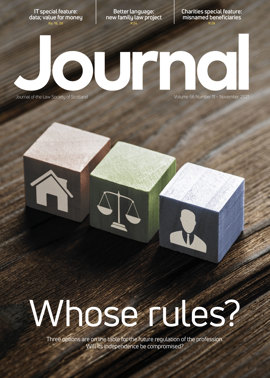Editorial: Regulation stakes
As I write, COP26 is well into its stride. While last month’s Journal set much of the scene from a lawyer’s point of view, it gives me pleasure to bring you this time round the opening address by former Irish President Mary Robinson at the UK law societies’ own climate conference just ahead of the UN event. Her account of climate change injustice, whether the profession is giving enough of a lead, and changing our own mindset as individuals, is as succinct as it is powerful.
But other issues also demand our attention, not least the Scottish Government consultation on our future regulation as a profession. Given the options presented, all the indications are that this will be a further and perhaps final round in a contest about independence. Not that anyone, at least overtly, is against the independence of the legal profession. But independence is invoked on both wings of the debate: on the one side those such as Esther Roberton who believe that the public interest demands the independence of the profession’s regulator from the profession itself, and on the other the Society and those in the profession who invoke the same public interest in maintaining that protecting the individual from the state is incompatible with any form of Government influence in relation to the regulator.
If a way were to be found of reconciling these views, some additional financial cost might be a price worth paying. But when professional legal services are already said to be beyond the means of much of the population, any solution that adds to the regulatory cost, which will of course be borne by the profession, would have a further public interest factor against it. Lawyers are entitled to be sceptical about claims that a new regulator, of whatever powers, will be cost neutral due to savings made by streamlining complaint handling.
In reality the choice as to which form of independence prevails is not so black and white, with each consultation option having built-in mechanisms to try and preserve both. Views on whether these attempts succeed, and the respective mischiefs that may arise from each option, may be crucial when it comes to the final political choice.
All the debate about regulation becomes a bit pointless if there is no profession left to regulate. Unlikely, you think? Ask the criminal legal aid sector, whose numbers continue to decline week by week in the face of pressures including better prospects in the prosecution service, but who still seemed to be at the back of the queue when it came to achieving a settlement ahead of COP26. To date, the Government appears to have underestimated the resolve of the sector to hold out for a more secure future. How long before, if you will pardon the expression, the penny drops?
Regulars
Perspectives
Features
Briefings
In practice
Online exclusive
In this issue
- Good legal software suppliers listen to you
- The trends that will shape law firms in 2022
- Technology won't solve everything...
- Key trends in legal tech adoption for UK law firms
- The top 4 benefits of moving to a cloud solution
- Why cyber risk management is not the same as IT support
- Business growth: finding the right package






